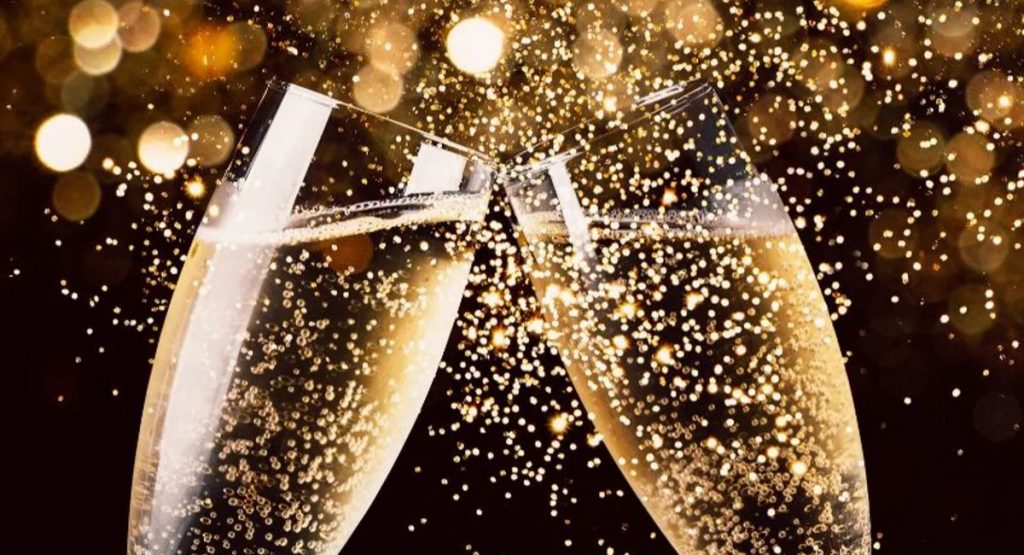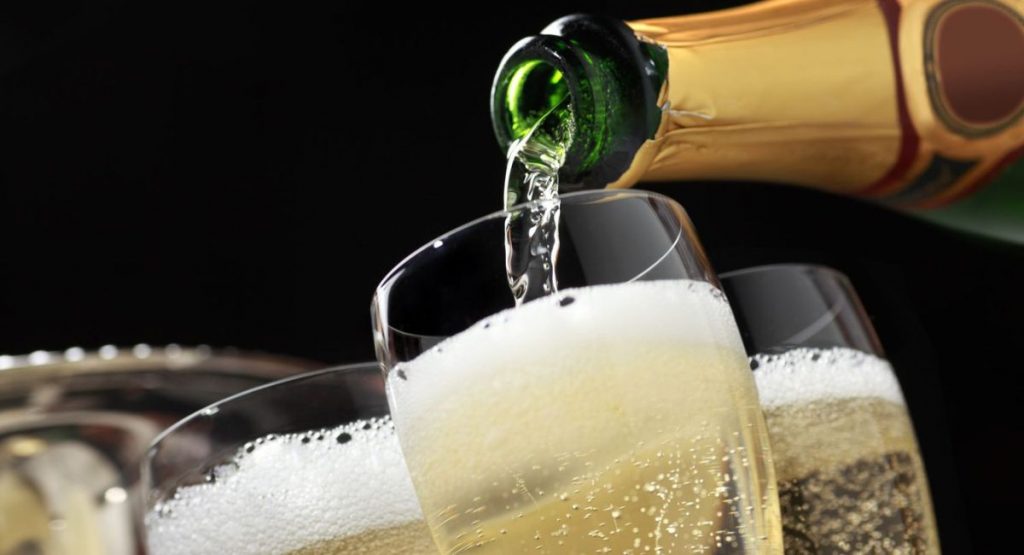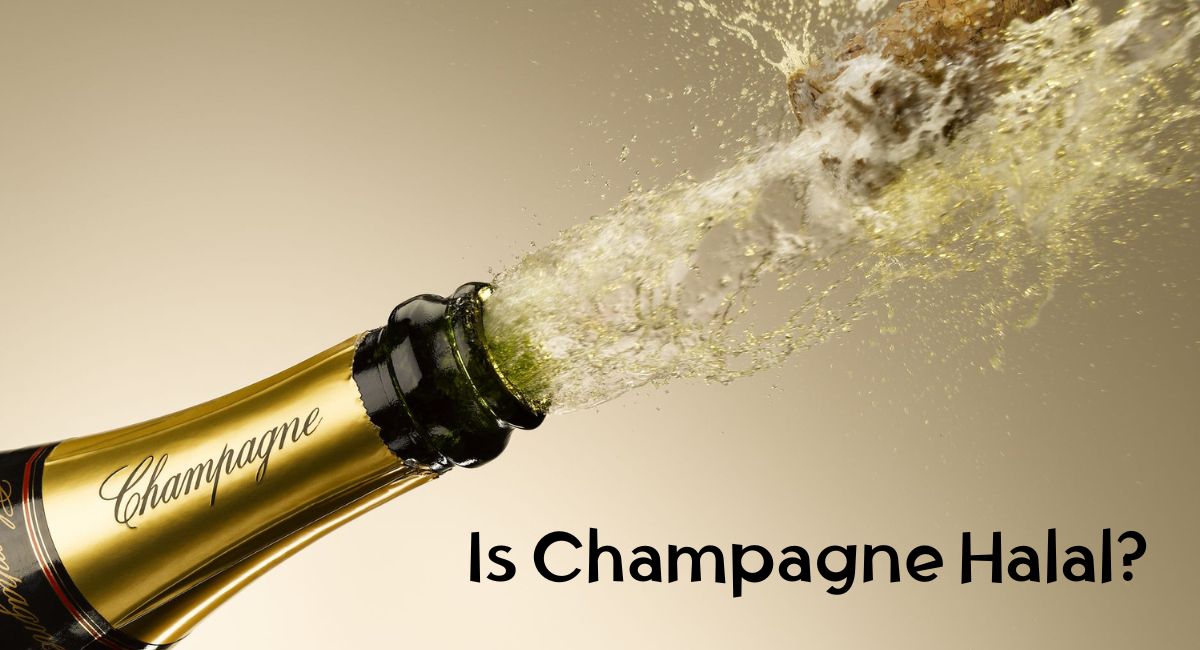Do you enjoy toasting a special occasion with a glass of bubbly? Or, perhaps, you just love the unique taste of champagne and want to enjoy it more often. But if you’re a Muslim, then this could be an issue – is champagne halal or not?
In this blog post, we will discuss all aspects of champagne to answer the question – is champagne halal? We’ll look at what goes into making champagne and cover some important considerations for Muslims when it comes to consuming this beverage.
By the end, you will have all the information necessary to make an informed decision on whether or not drinking champagne is compatible with your religious beliefs. So let’s get started!
What is Champagne

Champagne is a sparkling wine renowned for its effervescence and elegance, hailing from the Champagne region in northeastern France. Its history is deeply intertwined with the development of sparkling wines and the culture of celebration.
Champagne’s story dates back to the 17th century when winemakers in the Champagne region began producing wines that had an inherent effervescence due to the cold climate’s impact on fermentation. Initially, this effervescence was seen as a flaw, and bottles would often explode due to the pressure created by trapped carbon dioxide.
However, a crucial breakthrough came in the 17th century when Benedictine monk Dom Pérignon played a pivotal role in refining the winemaking process, controlling the secondary fermentation, and developing the traditional method of making Champagne. His contributions laid the foundation for the production of high-quality, sparkling Champagne.
Throughout the 18th and 19th centuries, Champagne gained popularity among European nobility and became synonymous with celebrations and luxury. It was famously favored by figures like Napoleon Bonaparte and became a symbol of prestige. In the 19th century, innovations such as the use of stronger glass bottles and cork stoppers further improved Champagne’s stability.
Today, Champagne is internationally renowned, and its production is tightly regulated to ensure quality. The region’s unique terroir, grape varieties (primarily Chardonnay, Pinot Noir, and Pinot Meunier), and meticulous winemaking techniques have made it a symbol of festivity and refinement, enjoyed during special occasions and festivities around the world.
Is Champagne Halal Or Haram

In Islam, consuming alcohol is generally prohibited according to the teachings of the Quran and the Hadith (sayings of Prophet Muhammad). Alcohol is seen as intoxicating and can impair a person’s judgment and behavior.
The Quran states
O you who have believed, indeed, intoxicants, gambling, [sacrificing on] stone alters [to other than Allah], and divining arrows are but defilement from the work of Satan, so avoid it that you may be successful.
Surah Al-Ma’idah 5:90
Champagne typically has an alcohol by volume (ABV) content that falls in the range of 11% to 12.5%. The exact alcohol content can vary depending on the specific Champagne producer, style, and vintage. Most Champagne falls within this range, but some may have slightly lower or higher alcohol levels. Therefore, being an alcoholic beverage, Champagne is generally considered haram.
Does Champagne Have More Alcohol Than Wine
Generally, champagne does have a higher alcohol content compared to most wines. Here’s a quick comparison:
- Champagne: The alcohol content of champagne ranges from 11.5-13%. Most standard champagnes contain around 12% alcohol.
- Table Wine: Most table wines like Cabernet, Merlot, Chardonnay, etc. tend to have alcohol contents between 11-13.5%. Many light table wines come in at 11-12.5% alcohol.
- White Wine: White wines on average tend to be lower in alcohol than reds. Many white wines range from 10-12% alcohol content. Riesling and Moscato are some of the lightest around 9-11%.
- Red Wine: Red wines typically have higher alcohol content than whites. Most range from 12-15% alcohol, with many full-bodied reds coming in around 13-14.5% alcohol.
So in summary:
- Champagne averages 12% alcohol
- Table wines average 11-13.5% alcohol
- White wines average 10-12% alcohol
- Red wines average 12-15% alcohol
The exact alcohol content depends on the specific type and brand of wine. But champagne generally falls at the higher end of the alcohol spectrum compared to most table wines and whites. The extra alcohol comes from champagne’s second fermentation process.
Delve into the realm of Islamic jurisprudence to find the answer to the question: Is wine halal? Explore the intricacies of grape fermentation, alcohol concentration, and the cultural significance of wine. Gain valuable insights into the diverse opinions within the Muslim community and the underlying principles that guide the classification of wine as halal or haram. Expand your understanding of this complex topic and navigate the boundaries set by Islamic teachings.
Is Non Alcoholic Champagne Halal
However, there are non-alcoholic versions of champagne available in the market which are considered halal.
Non-Alcoholic Champagne: Supporters of the view that non-alcoholic champagne is halal argue that it does not contain any intoxicating alcohol. Non-alcoholic champagne is produced through a process that removes the alcohol from the beverage while retaining its taste and effervescence. They believe that as long as the alcohol content is 0.0% or negligible, it would not have any intoxicating effects and should be permissible for Muslims to consume.
Different Scholarly Opinions: There are divergent opinions among Islamic scholars regarding the permissibility of non-alcoholic champagne. Some scholars believe that the ruling on non-alcoholic champagne should follow the general ruling on alcohol, and therefore it would be considered impermissible. Others argue that it should be treated differently due to its negligible alcohol content and the absence of intoxicating effects.
Consulting with Islamic Scholars: To get a more accurate and specific answer regarding the permissibility of non-alcoholic champagne, it is recommended for Muslims to consult with knowledgeable Islamic scholars. These scholars can provide guidance based on the teachings of Islam and the individual’s specific circumstances. They will take into account the different scholarly opinions and provide a ruling that aligns with Islamic principles.
However, there are some factors to consider when consuming non-alcoholic champagne:
- Intention: If one’s intention in consuming non-alcoholic champagne is to imitate non-Muslim practices, then it can be considered haraam (forbidden). For instance, if someone serves alcohol-free champagne in champagne glasses at an event to imitate non-Muslim celebrations, it is considered haraam.
- Perception: Even if the drink is halal, the act of buying or consuming it in public might lead others to believe one is consuming alcohol, which can bring disrepute to the individual and the Muslim community as a whole.
- Taqwa (God-consciousness): From a perspective of higher spiritual consciousness, it’s recommended to avoid anything that bears similarity to forbidden items, even if it’s technically permissible.
Is Saudi Champagne Halal
There is some debate amongst Islamic scholars on whether “Saudi champagne” can be considered halal. Here are some key points to take into account:
- Alcohol Content: Saudi champagne is made from 100% alcohol-free grape juice, so it contains no actual alcohol. This would make it permissible under stricter interpretations.
- Fermentation Process: Saudi champagne goes through a secondary fermentation process similar to traditional champagne. Some argue this natural fermentation makes it haram even without alcohol.
- Intoxicating Effect: Since there is no alcohol, Saudi champagne does not cause intoxication. This supports the view that it is halal.
- Alternative Name: Saudi champagne is sometimes called “Sparkling Grape Juice” or non-alcoholic sparkling wine. Using an alternative name avoids the champagne debate.
- Intention: If consumed with the intention of imitating haram alcoholic champagne, some scholars argue it would be forbidden. But if viewed as a non-alcoholic drink, it could be halal.
- Scholarly Opinions: Major Saudi institutions like the Standing Committee for Fatwa have permitted non-alcoholic champagne, while others prohibit it. Opinions vary across scholars.
In summary, there are reasonable arguments on both sides. Many Islamic experts and consumers view Saudi champagne as an acceptable halal alternative to traditional champagne. But some prohibit it due to its name and production process. Consulting scholars and individual conscience is best.
Is Fruit Champagne Halal
There is some debate among Islamic scholars regarding the halal status of fruit champagne or sparking juices made from fruits other than grapes. Here is a brief overview:
- Alcohol content: Most fruit champagnes are non-alcoholic, containing 0-0.5% alcohol from the natural fermentation process. This negligible alcohol content makes it more likely to be considered halal.
- Intoxicating effect: The extremely low alcohol in fruit champagne does not cause any intoxication. The lack of intoxicating effect leans towards it being permissible.
- Origin: Fruit champagnes are made from fruit juices like pomegranate, apple, orange etc. These fruits are halal in Islam. Some argue grape-based champagne is more questionable.
- Production method: The secondary fermentation used to make fruit champagne may be considered valid grounds to prohibit it by some scholars, even without alcohol. Others permit the production method.
- Alternative names: Using terms like “Sparkling fruit juice” or “fruit cider” instead of champagne or wine can resolve the naming issue.
- Intention: Drinking it as a permissible non-alcoholic beverage should not pose an issue according to many opinions. But some prohibit it if the intent is to mimic champagne.
In summary, there are opinions on both sides, but fruit champagne has a stronger case for permissibility according to many scholars. Checking ingredients, considering individual viewpoints, and avoiding the champagne name can help determine if a specific fruit champagne is deemed halal.
Types of Champagne
Champagne comes in various styles and types, each with its own unique characteristics and flavor profiles. Here are some of the main types of Champagne:
- Brut Champagne: This is the most common type of Champagne and is characterized by its dry taste. It contains very little residual sugar, usually less than 12 grams per liter, making it crisp and refreshing.
- Extra Brut: Even drier than Brut, Extra Brut Champagne has minimal sugar added during the dosage (the final sweetening stage). It is bone-dry, with less than 6 grams of residual sugar per liter.
- Sec Champagne: Contrary to what the name suggests, Sec Champagne is not actually dry; it is slightly sweet. It has between 17 and 32 grams of residual sugar per liter, making it a sweeter option for those who prefer a hint of sweetness.
- Demi-Sec Champagne: Demi-Sec translates to “half-dry,” and it is noticeably sweeter than Sec Champagne. It contains between 32 and 50 grams of residual sugar per liter, making it a popular choice for pairing with desserts.
- Rosé Champagne: Rosé Champagne gets its pink color from the addition of red grape juice during the winemaking process. It can vary in sweetness, from very dry (Brut Rosé) to sweeter versions (Demi-Sec Rosé). It often has fruity and floral notes.
- Blanc de Blancs: This Champagne is made exclusively from white grape varieties, usually 100% Chardonnay. It tends to be lighter and crisper, with citrus and mineral notes.
- Blanc de Noirs: In contrast to Blanc de Blancs, Blanc de Noirs is made from red grape varieties, primarily Pinot Noir and Pinot Meunier. It often has more body and red fruit flavors.
- Vintage Champagne: Vintage Champagnes are made from grapes harvested in a single exceptional year. They are aged for a longer period and are only produced in the best vintages. These wines showcase the unique characteristics of that specific year.
- Non-Vintage (NV) Champagne: Most Champagne produced falls into this category. Non-Vintage Champagne is a blend of wines from multiple years, carefully crafted to maintain a consistent house style. The aim is to produce a high-quality wine year after year.
- Prestige Cuvée: These are the top-of-the-line Champagnes produced by renowned Champagne houses. They are often made from the best grapes and aged for an extended period, resulting in exceptional quality and complexity. Examples include Dom Pérignon and Cristal.
- Grower Champagne: Produced by individual grape growers who also make their own Champagne. These often reflect the unique terroir of a specific vineyard or plot of land.
These various types of Champagne cater to different preferences and occasions, making Champagne a versatile and celebrated wine worldwide.
What Is Champagne Made Of
Champagne is made primarily from three grape varieties: Chardonnay, Pinot Noir, and Pinot Meunier. These grapes are carefully selected and blended to create the unique and complex flavors that Champagne is known for. Here’s a breakdown of the grape varieties used in Champagne production:
- Chardonnay: Chardonnay is a white grape variety and is one of the primary grapes used in Champagne production. It is known for its elegance and contributes to the wine’s acidity, freshness, and citrusy and mineral notes. Chardonnay grapes are often used in Blanc de Blancs Champagnes, which are made exclusively from white grapes.
- Pinot Noir: Pinot Noir is a red grape variety, but in Champagne, it is used to make both white and rosé Champagnes. Pinot Noir adds body, structure, and red fruit flavors to the blend. It is commonly used in Blanc de Noirs Champagnes, which are made from red grapes.
- Pinot Meunier: Pinot Meunier is another red grape variety used in Champagne production. It is known for its fruitiness and approachability. Pinot Meunier is often used in non-vintage Champagnes to add complexity and roundness to the blend.
The winemaking process for Champagne involves several key steps:
- Harvest: Grapes are carefully handpicked to ensure only the best-quality fruit is used.
- Pressing: The grapes are gently pressed to extract the juice, which is then fermented.
- Fermentation: The grape juice undergoes primary fermentation to convert sugars into alcohol. This can be done in stainless steel tanks or oak barrels.
- Blending: After fermentation, the base wines from different grape varieties, vineyards, and vintages are blended to create the desired flavor profile. This is where the winemaker’s artistry comes into play.
- Secondary Fermentation: A mixture of sugar and yeast is added to the blended wine, and the wine is bottled and sealed with a crown cap. This initiates a second fermentation, trapping carbon dioxide in the bottle, creating the bubbles.
- Aging: The bottles are aged on their lees (dead yeast cells) for a period of time, which can range from several months to many years, depending on the type of Champagne being produced. This aging process contributes to the complexity and depth of flavor.
- Riddling: Bottles are gradually rotated and tilted to move the yeast sediment toward the neck of the bottle.
- Disgorging: The frozen neck of the bottle is opened, and the pressure expels the yeast sediment. The bottle is then topped up with a mixture of wine and sugar, known as the dosage, to determine the final sweetness level.
- Corking: A cork and wire cage are used to seal the Champagne bottle.
Champagne is celebrated for its labor-intensive and meticulous production process, resulting in a wine with unique character, effervescence, and elegance. The combination of grape varieties, terroir, and winemaking techniques contributes to its world-renowned taste and quality.
Discover the answer to the age-old question: Is beer halal? Dive into a comprehensive exploration of the Islamic perspective on beer consumption. Unravel the complexities of the ingredients, brewing process, and alcohol content to understand the fine line between halal and haram. Join us on a journey of knowledge and understanding to determine the permissibility of beer in the context of Islamic teachings.






